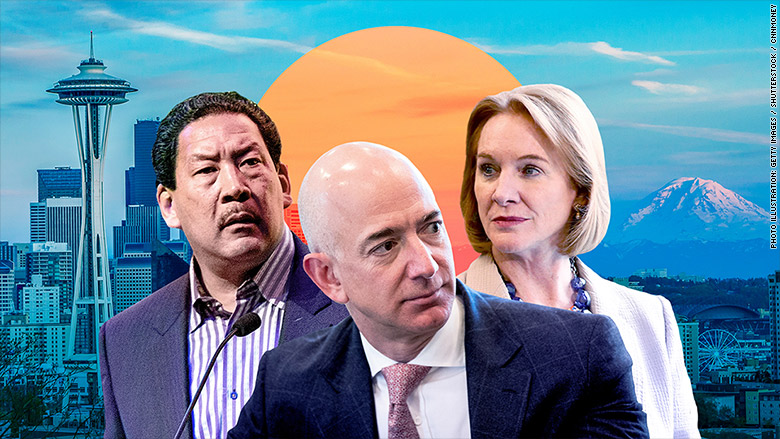
Seattle and Amazon screwed the homeless.
The war that pitted Seattle's City Council against Amazon, Starbucks and other businesses over homelessness has ended in a lose-lose-lose draw. It could go down as one of the biggest fiascos in the city's history as a leader of progressive policy, Seattle business and political leaders tell me.
The Council voted 9-to-0 to pass a compromise tax that will charge businesses $275 per-employee per year, instead of the $540 per employee figure initially proposed. Voter surveys show Seattle residents were overwhelmingly opposed to both proposals.
The city of Seattle lost because it failed to articulate a well-thought out strategy for dealing with homelessness; passed a watered-down bill that alienated the business community; and only won half as much revenue as it said it needed.
Sign up for PACIFIC: The new CNNMoney newsletter about the center of change and innovation
Amazon and big business lost because they fought the Council with threats and criticism rather than seizing the opportunity to take the lead on an issue that it has demonstrated a commitment to elsewhere.
The nearly 12,000 homeless people living in King County lost because Seattle and Amazon got in a pissing match.
This could have been avoided, business and political leaders in Seattle tell me.
Seattle Mayor Jenny Durkan could have brought the City Council together with Amazon, Starbucks and other businesses to hash out a plan that made sense for both sides. Seattle and Amazon could have then trumpeted their success as a model for how liberal cities and tech companies plan to deal with the homeless epidemic they've helped to create.
Instead, Amazon now says it is questioning its future in Seattle.
"We remain very apprehensive about the future created by the council's hostile approach and rhetoric toward larger businesses, which forces us to question our growth here," Amazon VP Drew Herdener says.
"The city does not have a revenue problem — it has a spending efficiency problem," he says. "We are highly uncertain whether the city council's anti-business positions or its spending inefficiency will change for the better." Amazon declined to comment further.
Starbucks is also angry: "This city continues to spend without reforming and fail without accountability, while ignoring the plight of hundreds of children sleeping outside," said Starbucks Senior Vice President John Kelley. "If they cannot provide a warm meal and safe bed to a five-year-old child, no one believes they will be able to make housing affordable or address opiate addiction."
Related: For Amazon HQ2 hopefuls, Seattle serves as a cautionary tale
The homelessness epidemic is the inconvenient truth of the tech boom that has fueled growth in Seattle, the Bay Area and Los Angeles, and its a problem for both city governments and the tech companies in their area.
City leaders and tech CEOs should own it. There is a massive opportunity to innovate on solving this issue. Doing it now would save lives (and generate good press). Avoiding it will yield massive problems down the line.

